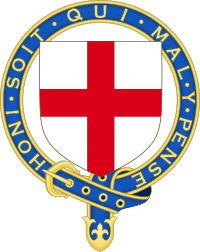
Back Orde van die Kousband Afrikaans Hosebendhād ANG فرسان الرباط Arabic وسام الرباط ARZ Bant ordeni Azerbaijani Ордэн Падвязкі Byelorussian Орден на жартиерата Bulgarian Orde de la Lligacama Catalan نیشانی گارتەر CKB Podvazkový řád Czech
| Most Noble Order of the Garter | |
|---|---|
 | |
| Awarded by the Monarch of the United Kingdom | |
| Type | Dynastic order |
| Established | 1348 |
| Motto | Honi soit qui mal y pense (Anglo-Norman for 'Shame on him who thinks evil of it')[1] |
| Criteria | At the monarch's pleasure |
| Status | Currently constituted |
| Founder | Edward III |
| Sovereign | Charles III |
| Chancellor | Eliza Manningham-Buller, Baroness Manningham-Buller |
| Prelate | The Bishop of Winchester (ex officio) |
| Classes |
|
| Statistics | |
| First induction | 1348 |
| Total inductees |
|
| Precedence | |
| Next (higher) | George Cross |
| Next (lower) | Order of the Thistle |
Ribbon of the Order of the Garter | |


The Most Noble Order of the Garter is an order of chivalry founded by Edward III of England in 1348. The most senior order of knighthood in the British honours system, it is outranked in precedence only by the decorations of the Victoria Cross and the George Cross. The Order of the Garter is dedicated to the image and arms of Saint George, England's patron saint.
Appointments are at the Sovereign's sole discretion, typically made in recognition of national contribution, service to the Crown, or for distinguished personal service to the Monarch.[2] Membership of the order is limited to the sovereign, the Prince of Wales, and no more than 24 living members, or Companions. The order also includes Supernumerary Knights and Ladies (e.g., members of the British royal family and foreign monarchs).
The order's emblem is a garter circlet with the motto Honi soit qui mal y pense (Anglo-Norman for 'Shame on him who thinks evil of it') in gold script.[3] Members of the order wear it on ceremonial occasions.
- ^ Cite error: The named reference
SGCwas invoked but never defined (see the help page). - ^ "The Order of the Garter". The Royal Family. 11 November 2015. Archived from the original on 7 April 2022. Retrieved 21 August 2016.
- ^ Bruges, William (1430–1440). "Stowe MS 594". William Bruges' Garter Book. Archived from the original on 9 January 2020. Retrieved 28 May 2023.
Languages: Anglo-Norman